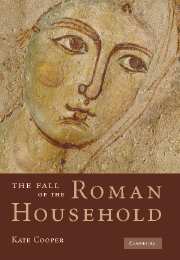Chapter 3 - Household and empire
Published online by Cambridge University Press: 22 September 2009
Summary
The cultural landscape explored in the previous chapter should not allow us to forget that the champions of romanitas were not exclusively men and women of leisure. More often than they wished to admit, they were engaged in running the productive concerns on which their wealth depended, and their management of these concerns was decisive for the well-being of their dependents, often numbering in the hundreds and sometimes thousands. Agricultural wealth was the basis on which cultured leisure rested, and for all the rhetoric of otium, the men and women of this class had to manage numerous agricultural holdings – or more precisely to direct the work of overseers in doing so. A pyramid of human effort depended on their will, involving slaves, tenants, and paid labourers. In addition, for the large landowners, there were periodic negotiations with their estate managers and with conductores, the large-scale tenants who leased whole estates; landowners might also themselves act as conductores, taking on parcels of imperial land or land belonging to other domini. In all of these negotiations, a balance had to be found between the financial interest of the domini and the ability of those below them in the pyramid to bear the weight of their leisure.
Otium and commerce were so closely yoked in the rural life of the dominus that it is often hard for the historian to tell them apart.
- Type
- Chapter
- Information
- The Fall of the Roman Household , pp. 93 - 142Publisher: Cambridge University PressPrint publication year: 2007

